Achievements and Announcements
ACHIEVEMENTS
- Mining, finance sector and more to benefit from $3.5m in ARC grants
- UniSA child protection warrior named 2025 Australian of the Year for South Australia
- Online learning at UniSA wins gold in new ranking
- UniSA climbs the ARWU Subject Rankings
- Research project to tackle growing threat of foreign disinformation campaigns
- UniSA Business awarded for student speed networking events
- Shark scientist lands a super catch for 2025
- Sociologist’s book about Gallipoli honoured
- PhD student project to create eco-friendly alternative to cement wins major prize
- On cloud eight: UniSA secures grants to support struggling kids
- Dr Guy Keulemans awarded for innovation in creative arts
- Cooperative Research Centre awarded $2.9m for work to support cancer treatment
- Other recent award winners, grant recipients and expert appointments
ANNOUNCEMENTS
- New diploma opens doors into sports management
- Australian Centre for Child Protection celebrates 20 years of improving the lives of vulnerable children
APPOINTMENTS
- UniSA appoints new Pro Vice Chancellor for Aboriginal Leadership and Strategy
- AI entrepreneur joins UniSA to lead research commercialisation
ACHIEVEMENTS
Mining, finance sector and more to benefit from $3.5m in ARC grants
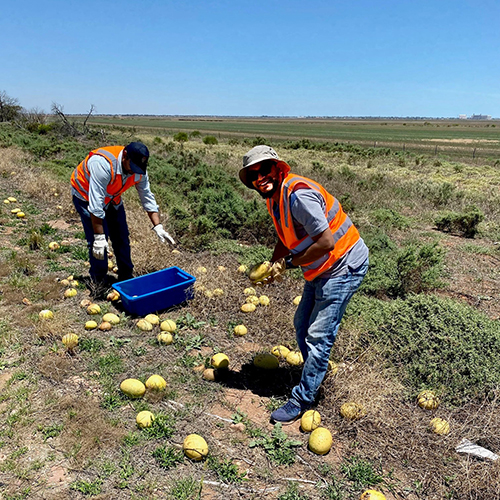 Prof Md Mizanur Rahman and Dr Rajibul Karim collect paddy melons for urease enzyme extraction.
Prof Md Mizanur Rahman and Dr Rajibul Karim collect paddy melons for urease enzyme extraction.Using extracts from one of Australia’s most invasive weeds to help prevent toxic waste material from escaping end of life mines, and investigating the use of AI in the financial services sector, are two of the research projects that will benefit from Australian Research Council (ARC) grants announced recently.
Six University of South Australia research teams were awarded more than $3.5 million in research grants from the ARC’s Discovery Projects scheme, which aims to support projects that provide economic, commercial, environmental, social and/or cultural benefits to the community.
The successful Discovery projects are:
Associate Professor Erik Champion, UniSA Creative ($520,686): Gamified collaborative exhibitions for an immersive 3D heritage repository.
Few research infrastructures support engaging and useful 3D heritage content for both archaeology and architecture. A user-focused, experiential immersive environment with AI content creation will be developed and evaluated. Audience and international expert feedback will create a flexible feature list. Workshops with museums and galleries will test the prototype's usefulness for communication and preservation. The system will allow groups to explore 3D models in conjectural and imaginative contexts and pose counterfactual arguments. The project will also consider how to convey levels of authenticity and uncertainty. Outputs will be a website with open-source tools and data, publications, a conference and a demonstration as an exhibition.
Professor Anthony Elliott AM, UniSA Justice and Society, $724,942: Enacting ChatGPT in Fintech: Identities, institutions, iterations.
The project investigates practices of user engagement with generative artificial intelligence (GenAI) in organisational and workplace contexts and will propose solutions to counter growing social and political concerns about human-machine interaction. The research aims to advance understandings about the formation of GenAI knowledge communities in the financial services sector, and how these communities of practice are reshaping the social and cultural consequences of emergent technologies. Expected outcomes include benchmark publications, enhanced international research capacity and an improved ability to address socio-technological problems in an area of vital importance to Australian society.
Associate Professor Philip Gregory, Centre for Cancer Biology ($750,292): Illuminating the functions of alternative splicing.
Almost all human genes produce several species of messenger RNA by a process called alternative splicing. These alternative RNAs make different proteins (isoforms) that are presumed to have different functions within a cell. However, the functions of most of these protein isoforms remain a mystery. This project aims to capitalise on advances in gene editing technology to determine the functional consequences of alternative splicing. It’s expected to reveal functions of protein isoforms that are essential for cell growth, movement, and cell state transitions. This technology is anticipated to facilitate better understanding of human development, future treatments, and improvements in agricultural applications.
Professor Sharad Kumar, Centre for Cancer Biology, ($733,179): A new mechanism regulating cell death.
Cell death in multicellular organisms is vital for disposing of damaged and unwanted cells to maintain homeostasis. The project aims to understand how specific protein modification via the process of ubiquitination regulates Gasdermins, the executioners of pyroptosis, a distinct type of cell death. State-of-the-art molecular and cellular approaches will be used to discover mechanisms that control Gasdermins to manage cell death response. Given the essential nature of cell death the outcomes will generate high value conceptual knowledge in a topical field of broad biological significance. This is expected to enhance Australia’s research reputation and capability, foster international collaborations and provide training for PhD students.
Professor Md Mizanur Rahman, UniSA STEM, ($401,500): Stabilising tailings dam capping with plant-based enzymes.
This project will extract cheaper plant-based urease enzymes from an Australian weed, paddy melon seeds, and develop their kinetics framework for calcium carbonate precipitation for binding and stabilising tailings, by-products of the mining operation. It significantly reduces the cost of cementation and will be a sustainable alternative to cement and other chemical additives with a very high carbon footprint. This novel approach will stabilise tailings storage facilities (TSFs) surface/capping upon ceasing mining operations. A constitutive and user-defined model for numerical software will be developed to ensure faster and greener technology transfer in mining closer activities, which currently is the largest industry for the national GDP.
Professor Yan Zhuge, UniSA STEM, ($402,221): 3D printed strain-graded green concrete with co-extruded FRP reinforcement.
3D concrete printing (3DCP) offers many advantages over traditional construction methods, but its practical application is hindered by the reinforcement implementation. This project aims to develop a novel co-extrusion technique for 3DCP, integrating flexural fibre-reinforced polymer grid reinforcement. It also seeks to leverage alkali-activated slag binder as a sustainable alternative to Portland cement, with significantly lower CO2 emissions and excellent early age strength required for high-quality 3DCP. Expected outcomes include innovative techniques for reinforced 3DCP and optimized models for strain-graded concrete. The findings will shape the next generation of digital construction for safety, durability and sustainability.
UniSA child protection warrior named 2025 Australian of the Year for South Australia
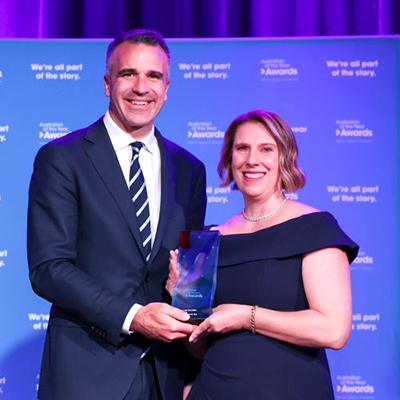 SA Premier Peter Malinauskas presents the 2025 SA Australian of the Year award to UniSA Professor Leah Bromfield. Photo by Salty Dingo.
SA Premier Peter Malinauskas presents the 2025 SA Australian of the Year award to UniSA Professor Leah Bromfield. Photo by Salty Dingo.UniSA child protection expert Professor Leah Bromfield, who has devoted her life to establishing practical, evidence-based solutions to child abuse and neglect, has been named the 2025 Australian of the Year for South Australia.
Professor Bromfield, Director and Chair of Child Protection at UniSA’s Australian Centre for Child Protection (ACCP), received the award from the SA Premier Peter Malinauskas at a ceremony in November.
Judges described the 46-year-old as “one of the most trusted researchers in her field”, noting her advocacy for Australia’s first National Framework for Protecting Australia’s Children in 2007.
Prof Bromfield’s calls for transformation and radical redesign have led to world-first insights and contributed to significant changes in the understanding of, and responses to, child abuse and neglect.
She is leading the development of a new child protection vision for SA, exploring unconventional approaches to break the cycle of abuse.
Accepting the award, Prof Bromfield paid tribute to the thousands of people working in Australia’s child protection sector.
“The work is hard and not very glamorous, but it is critical for our young people,” she said.
“I go to work every day knowing that I’m part of making a difference, that we’re doing the research and developing policy and resources to actually change practice on the ground.
“Our decisions and actions are making it better for kids, families and practitioners, including the frontline workers who are doing their best to help children and families in need.”
Prof Bromfield’s award coincide with ACCP’s 20th birthday, marking two decades of helping to prevent and respond to child abuse and neglect.
She will join winners from each state and territory for a national reception in Canberra with the Prime Minister.
Online learning at UniSA wins gold in new ranking
UniSA has been awarded gold in the inaugural Times Higher Education Online Learning Rankings (OLR) 2024 – the only Australian university to receive the outstanding ranking.
The Online Learning Rankings (OLR) is a new global ranking that evaluates only the parts of a university that deliver online learning. Its focus is on teaching excellence, rather than technical capability in online delivery. The ranking places universities into three categories: gold, silver and bronze.
Only 11 universities worldwide were awarded gold – with the US, UK and India having the most; and UniSA being the only university which made the list from Australia.
UniSA’s Gold placement reflects the success of UniSA Online, which incorporates interactive programs specifically designed for the online environment, access to academics seven days a week, and a wide breadth of study areas.
The pilot online learning ranking used 17 metrics grouped into four pillars covering resources, engagement, outcomes and environment.
Read more on the Times Higher Education website.
UniSA climbs the ARWU Subject Rankings
Three UniSA subjects are in the top 100 in the world, according to the latest results published by one of the world’s major university rankings.
In the Academic Ranking of World Universities, also known as the Shanghai Ranking, 2024 Global Ranking of Academic Subjects, UniSA climbed into the top 50 for Hospitality and Tourism Management (33), up from 51-75 in 2023. UniSA was also named in the top 100 for Education (76-100) and Mining and Mineral Engineering (76-100).
UniSA also has four subjects in the top 200: Business Administration (101-150), Nursing (101-150), Civil Engineering (151-200) and Public Health (151-200).
UniSA improved or maintained its ranking in all but one subject. The result reflects UniSA’s successful focus on research strength and excellence over the past few years.
Research project to tackle growing threat of foreign disinformation campaigns
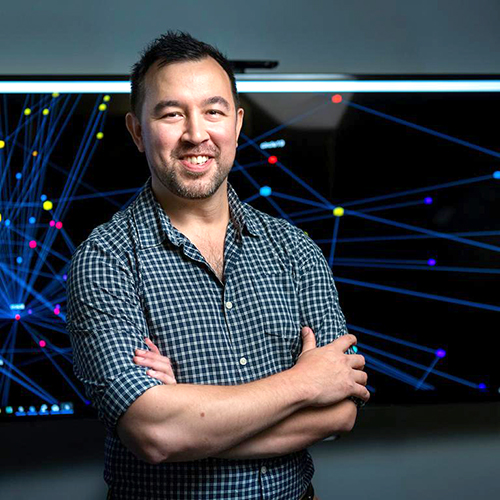
UniSA narrative visualisation expert Dr Andrew Cunningham will lead a $2.9 million project to develop tools and techniques to help defence analysts detect AI-enabled foreign disinformation campaigns targeting Australia.
The immersive technologies researcher, along with colleagues from the University of Adelaide and UTS, will build a toolkit called ANVIL (Analysis and Narrative Visualisation Intelligence Layer), “integrating human ingenuity with algorithmic precision”.
“Our approach will ensure that analysts can interrogate, contextualise, and respond to disinformation campaigns, which are an evolving challenge for Australia,” Dr Cunningham says.
“Australia faces an escalating threat to its sovereignty, social stability and economic uncertainty from the deliberate spread of false information by foreign sources. They are intensifying due to the rapid dissemination of social media and the scale of generative AI technologies.”
The project is one of 21 contracts totalling $60 million with Australian universities and industry partners, funded under the Federal Government’s Advanced Strategic Capabilities Accelerator and aligned with defence priorities.
UniSA Business awarded for student speed networking events
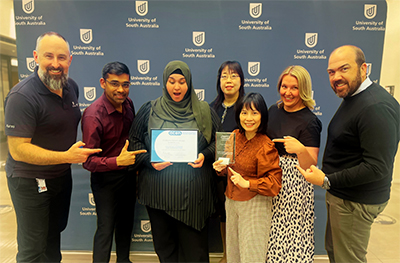 UniSA Business team members at the ACEN awards.
UniSA Business team members at the ACEN awards.A networking event series run by UniSA Business and designed to increase the number of student-sourced placements and improve students’ networking skills has been recognised by the Australian Collaborative Education Network (ACEN).
ACEN is the national professional association for work-integrated learning (WIL) and collaborative education. ACEN advances collaborative, quality and inclusive WIL through scholarship, partnerships, and professional learning.
UniSA Business won the ACEN’s People’s Choice Award for its Student to Industry Speed-Networking Events which have increased student-sourced placements at UniSA, helping to enhance student employability and strengthen opportunities for industry partners.
Student-sourced placements are work placements that a student finds through their own efforts.
Since the networking events commenced in 2019, student-sourced placements at UniSA increased from 26% to 66%.
UniSA Business Partner Engagement Manager: Internships, Daryl McMahon, says local industry awareness, engagement and satisfaction with internships has also increased.
“Placements are often directly transferable to post-university employment, with 25% of students gaining employment with their host organisation, 50% being recommended for employment elsewhere, and 40% having an ongoing mentoring relationship,” he says.
“The networking program is championed across the tertiary sector as a best practice model for engaging industry in student placements.”
ACEN, soon to be known as Work Integrated Learning Australia, holds the 2024 WIL (work integrated learning) awards every second year, presenting a Local Hero Award, Collaboration Award, Innovation and Excellence Award, People’s Choice Award and Honorary Life Memberships.
Shark scientist lands a super catch for 2025
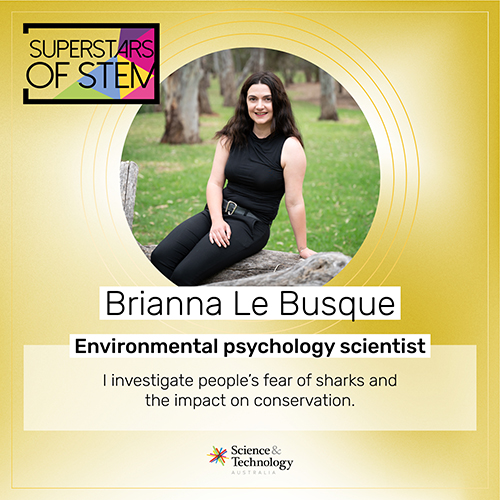
UniSA environmental psychology scientist Dr Brianna Le Busque has been named a Superstar of STEM for her work to change society’s negative perceptions of sharks and promote their conservation.
Dr Le Busque is one of 60 scientists recognised nationally by Science & Technology Australia, celebrating the country’s most inspiring female and non-binary people working in STEM, who are smashing the stereotype of “an old man in a white lab coat”.
The UniSA behavioural scientist has undertaken multiple studies to address the public’s irrational fears of sharks, unfairly depicted as monsters in popular culture since the 1975 blockbuster horror film Jaws contributed to a rise in shark hunting and subsequent decimation of the species.
“In reality, sharks pose little threat to humans. The chances of being killed by a shark in Australia are one in 8 million – but the damaging hype generated by media and shark movies has fed these fears and seriously harmed conservation efforts,” Dr Le Busque says.
Globally, 100 million sharks are killed each year and a quarter of shark species threatened by extinction.
Dr Le Busque, who has published 17 peer-reviewed publications and presented at nine conferences, will use her Superstar of STEM profile to highlight the appeal of non-traditional science careers, including conservation and environmental science.
“The human and psychological aspects of science are fascinating. I want to show people, particularly women and gender diverse people, that science is not restricted to working in a lab or using microscopes. I talk to people, I do surveys, read newspaper articles, and watch shark films. That is my science.”
While undertaking her PhD, Dr Le Busque created a blog and Instagram account to inspire and support other PhD students and scientists, building a large female following. She continues to use Instagram as a platform to encourage women to pursue a career in science, as well as mentoring female undergraduate students.
The STEM Superstars program was launched in 2017, aiming to smash gender assumptions about who can work in science, technology, engineering and maths.
Sociologist’s book about Gallipoli honoured
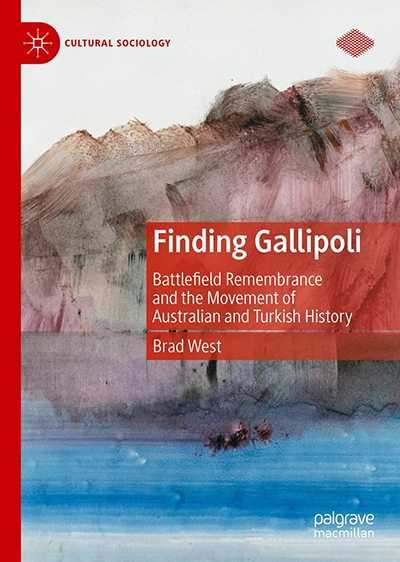
A book about Gallipoli by a UniSA sociologist has been named the best authored book in Australian sociology by the peak professional association for Australian sociologists.
UniSA Associate Professor Brad West has been awarded the 2024 Stephen Crook Prize for the best authored monograph published within the discipline of sociology in the previous two years.
This distinguished award from The Australian Sociological Association (TASA) went to his book Finding Gallipoli: Battlefield Remembrance and the Movement of Australian and Turkish History.
Assoc Prof West received the award at TASA’s annual conference in Perth in November.
“I am deeply honoured to receive this prize, something that has been awarded in the past to many esteemed sociologists,” he says.
Assoc Prof West says he’s grateful to those who supported the book and the extensive journey of his work.
“This book is the outcome of over 20 years of research, spanning not only a significant personal and professional journal of learning but also many trips to Türkiye,” he says.
“The cross-cultural aspect of the book would not have been possible without the generosity of the Turkish people and colleagues who assisted with my research over many years.”
The focus of the book on how Australian and Turkish understanding of the Gallipoli campaign has been shaped by travel or exile from the battlefields has meant that it has not only been well received by fellow Australian sociologists, but by those across the humanities and social sciences.
University of Sydney historian Richard White said: “This remarkable book deservedly won the Stephen Crook memorial prize because it does so many things: analysing war – and the memory of war – through the illuminating lens of travel; rethinking the nationalist meanings of Gallipoli by comparing Australian and Turkish responses; and exploring the social memory of war through commemoration, memorialisation and the development of rituals around remembrance, especially pilgrimage.”
Associate Director of the Yale Center for Cultural Sociology, Yagmur Karakaya, congratulated Associate Professor West.
“Finding Gallipoli not only teaches the reader about the intricacies of this specific case, but also offers theoretical purchase on how transnational mobility and space relate to meaning-making,” she says.
“I highly recommend this book not only to scholars and students of Turkey and Australia, but also to theorists of culture, mobility, nationalism, and tourism.”
Having previously been the recipient of TASA’s Best Paper Award, Assoc Prof West is the only person to have won both of these major national prizes in sociology. He is now in the process of writing his next book, drawn from recent studies he has undertaken on the complex identity of Australian military personnel today and what it means to be a contemporary veteran.
PhD student project to create eco-friendly alternative to cement wins major prize
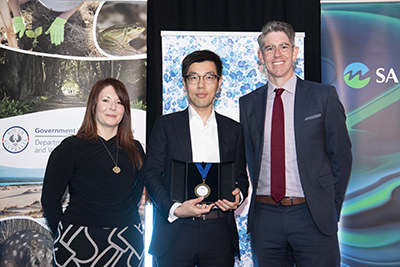 UniSA PhD student Weiwei Duan (centre) and Hodgson Medal: Student Water Prize winner with Australian Water Association SA branch president Carly Souter (left) and the Office of Northern Water Delivery (award sponsor) chief executive Matt Hardy (right).
UniSA PhD student Weiwei Duan (centre) and Hodgson Medal: Student Water Prize winner with Australian Water Association SA branch president Carly Souter (left) and the Office of Northern Water Delivery (award sponsor) chief executive Matt Hardy (right).Research by a UniSA PhD student into the use of water treatment residue to create a sustainable construction material, has been recognised by the Australian Water Association with a major award.
UniSA Civil Engineering PhD student Weiwei Duan was awarded the Hodgson Medal: Student Water Prize at the Australian Water Association’s (AWA) Water Awards SA in November.
The awards recognise inspiring leadership and innovative research, programs and infrastructure projects. Weiwei’s PhD research demonstrates the successful use of water treatment residue, a by-product from water treatment process, to create a sustainable construction material.
This material is an eco-friendly alternative to traditional cement, offering improved durability, acid and corrosion resistance, while reducing carbon emissions and providing a circular solution for industrial waste management.
Weiwei was one of three UniSA finalists who attended the awards ceremony. Professor in Structural Engineering Yan Zhuge is Weiwei’s principal supervisor.
AWA Chief Executive Corinne Cheeseman says the winners showcase outstanding collaboration and innovation.
"Congratulations to all the winners and finalists of this year’s Water Awards SA. Your achievements reflect the innovation, dedication and collaborative spirit that define our sector,” Cheeseman says.
Weiwei, now a state winner, will present his paper at the national 2025 Ozwater conference and join the other state winners in contention for the national award.
On cloud eight: UniSA secures grants to support struggling kids
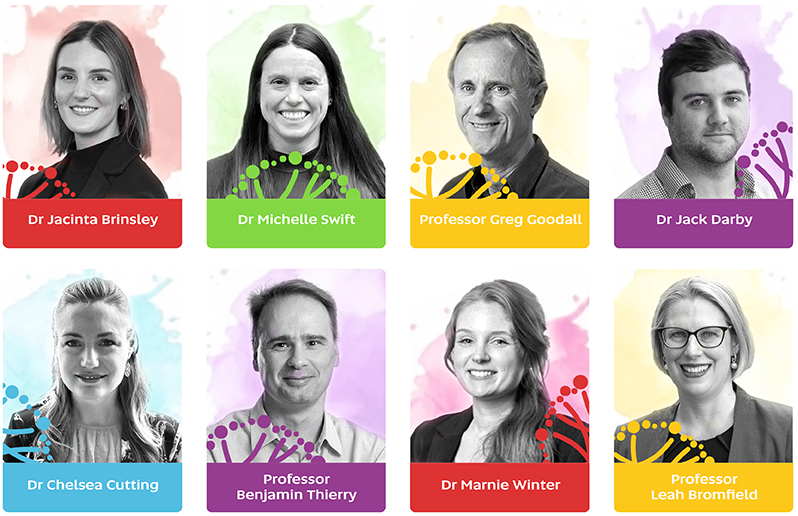
Whether it’s the development of a board game to tackle teenage mental health or deciphering treatment-resistant brain tumours, UniSA is stepping up to support children struggling with mental and physical health concerns.
Eight UniSA research projects have been awarded almost $740,000 in research funding from the Channel 7 Children’s Research Foundation (CRF) to help improve children’s health and wellbeing.
The successful projects comprise:
- MindScape: Co-creation of an evidence-based board game to address adolescent mental health. Lead investigator: Dr Jacinta Brinsley.
- A Phase 1 trial of group improvisational theatre games that include Acceptance and Commitment Therapy treatment for children and teens who stutter. Lead investigator: Dr Michelle Swift.
- Minimising treatment-induced disease in children with the nerve cell cancer neuroblastoma. Lead investigator: Professor Greg Goodall.
- Turning off the danger signal: reducing ventilator-induced lung injury in preterm babies. Lead investigator: Dr Jack Darby.
- Launching Early Childhood Numeracy: Fostering mathematical self-efficacy of preschool children and their parents for lifelong learning. Lead investigator: Dr Chelsea Cutting.
- Developing lab-grown paediatric brain tumours that mimic the response to treatment of real tumours to learn how they adapt and resist radiotherapy. Lead investigator: Professor Benjamin Thierry.
- Improving the understanding of fetal DNA found in maternal blood during pregnancy towards designing more comprehensive non-invasive prenatal genetic tests. Lead investigator: Dr Marnie Winter
- Re-examining the scope of statutory child protection to improve responses to children. Lead investigator: Professor Leah Bromfield.
Dr Guy Keulemans awarded for innovation in creative arts
UniSA Enterprise Fellow Dr Guy Keulemans has been named the Distinguished Innovation in Creative Arts Award Winner in the Australian Council of Deans and Directors of Creative Arts’ (DDCA) inaugural awards.
The DDCA is a representative body for the creative arts in Australian Universities and launched the awards program in aim of recognising contributions to the sector.
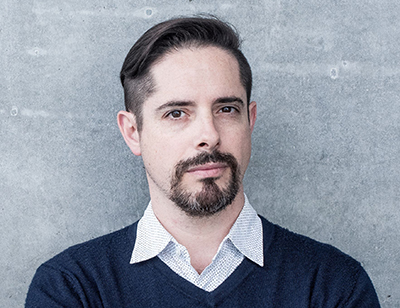
Dr Guy Keulemans is a member of the University’s Creative People, Products and Places Research Centre (CP3) and specialises in sustainable craft and design, specifically new forms of repair and reuse as part of the broader field of circular economy.
An artist and designer, he exhibits internationally and has work acquired by the National Gallery of Victoria and the Art Gallery of South Australia.
His current research project, Transformative Repair, is funded through the Australian Research Council Linkage Project in partnership with Australian Design Centre and local craft and design institution JamFactory.
Transformative Repair involved more than a dozen designers, artists and craftspeople repairing a collection of beloved items, each cherished by owners who witnessed the possessions undergo remarkable transformations.
Among the treasured objects was a well-loved Louis Vuitton bag, frayed necklaces designed by local jewellery designer, the late Alice Potter, a broken Khai Liew chair, a timber knitting table, a cumulus light, an old hammer, damaged audio speakers, and various “stuff from a shed”.
The renewed creations were then showcased at JamFactory earlier this year.
It is the second iteration of the Transformative Repair project, the first being in 2022 when a collection of old or damaged items, including a dented, red Vespa scooter belonging to actor Yael Stone, were given a new lease on life and auctioned at the Australian Design Centre in Sydney.
The DDCA Award judges commended Dr Keulemans’ significant body of work.
“This is a highly commendable research initiative that places creative practice at its core, fostering the creation of joyful, thoughtful, and sustainable objects. It not only advances knowledge but also proposes models for new, adaptive ways of living in a rapidly changing world,” says judge Dr Simon Spain.
It’s been a big year of awards for Dr Keulemans who also won the by the Australian Council of University Art and Design Schools (ACUADS) Excellence in Research Award as well as UniSA Creative’s Innovation in Research Award.
Cooperative Research Centre awarded $2.9m for work to support cancer treatment
A groundbreaking project to establish a sovereign supply chain for a critical medical isotope used as part of the treatment of advanced metastatic cancers, has been awarded a $2.9 million grant.
The Department of Industry, Science and Resources awarded the grant to entX Limited and partners, including UniSA, as part of the Cooperative Research Centres Projects (CRC-P) grant program.
This grant will support the Mines to Medicines – Sovereign Nuclear Medicine Supply Chains from Waste project. The project is working to establish a sovereign supply chain for lead-212 (Pb-212), a vital isotope used in Targeted Alpha Therapy (TAT) for advanced metastatic cancers, including prostate cancer and neuroendocrine tumours.
Leveraging expertise in the resource, nuclear, and medical sectors, entX aim to extract Pb-212’s parent isotope, thorium-228 (Th-228), from industrial waste streams using novel process technologies and deliver it for clinical use.
Other recent award winners, grant recipients and expert appointments
Other recent award winners, grant recipients and expert appointments from UniSA include:
- UniSA academic and clinician Professor Susan Hillier has been appointed to the main statutory authority of the Australian Government responsible for medical research, the National Health and Medical Research Council (NHMRC). Members of the NHMRC Council bring expertise in public health and medical research. The Australian Government has appointed the NHMRC Council for 2024 to 2027. Prof Hillier has been appointed as a member with expertise in health care training.
- The Australian Research Council (ARC) has inducted UniSA Bradley Distinguished Professor Sharad Kumar into the its 2025 College of Experts. The ARC College of Experts plays a key role in identifying research excellence, moderating external assessments of research grant proposals and recommending projects to be funded.
- The Academy of the Social Sciences in Australia has made UniSA adjunct and expert in literacy development, teaching and social justice Emeritus Professor Barbara Comber, a 2024 Fellow. Prof Comber is one of 20 new fellows elected in 2024 in recognition of their outstanding contributions across a diverse range of fields.
- Bachelor of Engineering (Honours) (Electrical and Electronic) graduate Mary-Ann Stephen Kingu from Tanzania was named Rising Star Alumni in the 2024 StudyAdelaide International Student Awards. In addition, the following UniSA students received high commendations for their respective efforts into research including reactive soil movement, offsite construction practices and water scarcity solutions: Civil Engineering PhD student Bikash Devkota from Nepal; Master of Engineering (Water Resources Management) student Hoan To from Vietnam; Construction Management PhD student Tennakoon Mudiyanselage Maheshi Pabasara Tennakoon from Sri Lanka.
- UniSA online journalism student William Hunter won the Student Journalism Award at the 2024 SA Press Club Awards. The SA Press Club Awards are dedicated to recognising excellence in South Australian journalism, across both traditional and contemporary platforms. UniSA journalism and creative writing student Jade Woolacott was Highly Commended for the Student Journalism Award while UniSA communication and media graduate (2023) and ABC journalist Amelia Walters was commended for the Young Journalist of the Year Award and Highly Commended for the Best Regional or Rural Report in Any Medium.
ANNOUNCEMENTS
New diploma opens doors into sports management

People wanting hands-on experience and insight into working at an AFL club can apply to study a new sports management diploma with UniSA and the Adelaide Crows.
Starting in 2025, the Diploma in Sport Management is a 12-month program that provides students with foundational knowledge and practical skills for a career in sports management.
Covering areas including commercial operations, marketing and managing the athletic pathway, the program will also see students complete a minimum of 100 hours of placement at the Adelaide Football Club, including on match day, and in the community programs and membership department.
The Adelaide Football Club will offer two full-time employment positions to the top graduates each year. All students who successfully complete the diploma will obtain credit towards a Bachelor of Business (Sport Management) at the new Adelaide University, which is being created through the amalgamation of UniSA and the University of Adelaide and will open in January 2026.
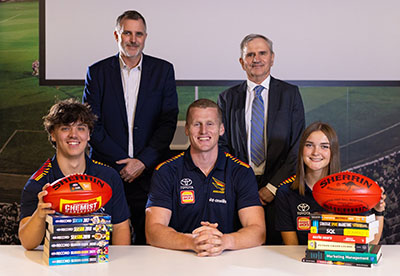 Crows CEO Tim Silvers (left, back) and Executive Dean UniSA Business Professor Andrew Beer (right, back), with high school students Thomas Mansfield (left), Ella Litchfield (right) and Crows player Reilly O’Brien.
Crows CEO Tim Silvers (left, back) and Executive Dean UniSA Business Professor Andrew Beer (right, back), with high school students Thomas Mansfield (left), Ella Litchfield (right) and Crows player Reilly O’Brien.Crows CEO Tim Silvers says the new offering is a unique and exciting opportunity for anyone passionate about pursuing a career in sport.
“The diploma is more than just a qualification, but a stepping stone towards a career in sports management,” Silvers says.
“To be able to study in a full-time professional environment of an AFL club is a great opportunity to immerse yourself in the club and learn directly from management and staff.”
UniSA Vice Chancellor Professor David Lloyd says the initiative was a great match to the University’s values and goals.
“UniSA is globally recognised for our world-class teaching in business, which has a focus on practical work experiences, and our lecturers include some of the world’s leading sport management researchers,” Prof Lloyd says.
“Blending our expert teaching with the opportunity to complete a placement with the Adelaide Football Club is a fantastic option for students interested in this field.
“The Adelaide Football Club is not only a highly successful sporting business, it’s also a leader in delivering community programs that align with UniSA’s commitment to education, health, equity and reconciliation. We’re delighted to expand our partnership with the Crows through this initiative, which will help shape sports management leaders ready to succeed in South Australia and beyond.”
The diploma will include eight courses over two semesters, which will be taught both online and in-person at the Adelaide Football Club and UniSA’s City West Campus. The first intake will run from August 2025 to June 2026.
Visit the website for more information or to register interest.
Australian Centre for Child Protection celebrates 20 years of improving the lives of vulnerable children
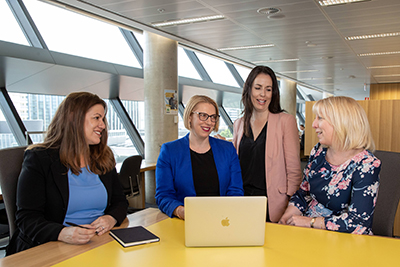 Left to right: Professor Melissa O’Donnell, Deputy Director Research; Professor Leah Bromfield, Director and Chair of Child Protection; Amanda Paton, Deputy Director Practice; Lisa McDonald, Centre Manager.
Left to right: Professor Melissa O’Donnell, Deputy Director Research; Professor Leah Bromfield, Director and Chair of Child Protection; Amanda Paton, Deputy Director Practice; Lisa McDonald, Centre Manager.The Australian Centre for Child Protection (ACCP), founded in 2004 by the Australian Government and UniSA, is celebrating its 20th birthday and two decades of helping to prevent and respond to child abuse and neglect.
The ACCP’s public health approach to child protection saw it quickly gain influence across the sector early on, making major contributions to the first National Framework for Protecting Australia’s Children and the National Research Agenda for Protecting Children.
Current areas of focus include families with multiple and complex needs, preventing infant removals, child sexual abuse, harmful sexual behaviours, out-of-home care and issues impacting Aboriginal and Torres Strait Islander children and families.
The centre celebrated its 20th birthday in October.
Centre Director Professor Leah Bromfield says that the ACCP’s third decade marks a shift in focus to a transformation agenda.
“We know through our work across the past two decades that our child protection systems are not fit for purpose, and we must reimagine our approach to protecting children. ACCP is driving research and innovation to shape this transformation now and into the future,” she says.
“This new approach has the potential to be an example to the rest of the world.”
APPOINTMENTS
UniSA appoints new Pro Vice Chancellor for Aboriginal Leadership and Strategy
UniSA has appointed an experienced Aboriginal health and wellbeing researcher and advocate as its new Pro Vice Chancellor for Aboriginal Leadership and Strategy.
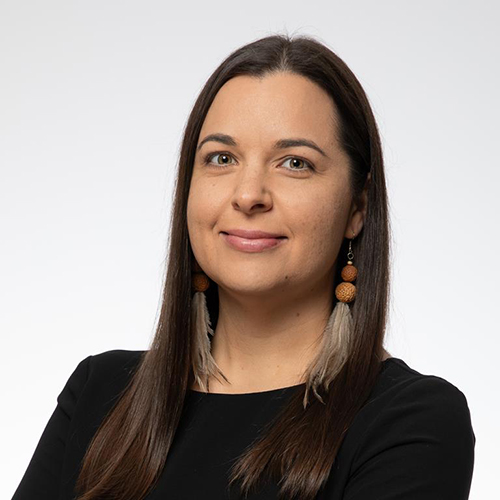
Professor Tina Brodie, who joined UniSA in July as Dean of Aboriginal Research, Education and Engagement, was appointed to the role of Pro Vice Chancellor: Aboriginal Leadership and Strategy in October.
UniSA Standing Acting Vice Chancellor Distinguished Professor Marnie Hughes-Warrington AO says Prof Brodie has published several groundbreaking pieces on Aboriginal and Torres Strait Islander health and wellbeing.
“Tina’s track record is impressive, and unsurprisingly, in less than six months, under her leadership [as Dean], we’ve seen positive advancements in Aboriginal affairs and reconciliation at UniSA,” Prof Hughes-Warrington says.
“Please join me in congratulating Tina on her PVC appointment.”
Prof Brodie is an Aboriginal woman with connections to Yawarrawarrka and Yandruwandha (South Australia) and has an affiliation with Wardliparingga Aboriginal Health Equity Research Unit at the South Australian Health and Medical Research Institute (SAHMRI) and the University of Adelaide in the Faculty of Health and Medical Sciences. She has expertise in social work, counselling and psychotherapy, Aboriginal and Torres Strait Islander community engagement and Indigenous methodologies.
With more than 17 years of experience in Aboriginal health and wellbeing in research, education, clinical, project and leadership roles, Prof Brodie’s research explores Aboriginal and Torres Strait Islander social and emotional wellbeing, mental health and the social determinants of health.
AI entrepreneur joins UniSA to lead research commercialisation
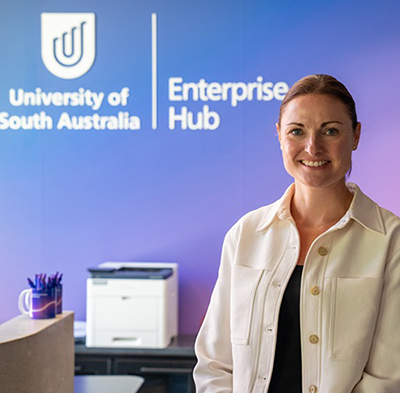 Dr Michelle Perugini at UniSA's Enterprise Hub.
Dr Michelle Perugini at UniSA's Enterprise Hub.Leading South Australian health and technology entrepreneur Dr Michelle Perugini has joined UniSA as its new Head of Commercialisation.
Dr Perugini is the founder of two successful AI tech ventures, an award-winning predictive analytics solution that was acquired by global consultancy EY, and an AI healthcare company (Presagen) that developed an AI IVF tool, Life Whisperer, recently acquired by global medical equipment manufacturer, Astec.
She worked in medical research early in her career, including for UniSA at its Centre for Cancer Biology, following completion of biotechnology and medicine qualifications at UniSA and the University of Adelaide. Dr Perugini has been recognised by multiple awards including a 2023 AmCham Alliance Award Highly Commended (AI), 2022 Pearcy Entrepreneur Award, Telstra Health 2022 Brilliant Women in Digital Health Award, and the 2021 Women in AI Healthcare Award.
Dr Perugini will bring her proven strengths in commercialising research to a critical role at UniSA, leading its intellectual property (IP) and research translation activities including as CEO of UniSA Ventures, the University’s commercialisation subsidiary.
UniSA Director for Enterprise Partnerships, Peter Stevens, says he’s “delighted to welcome Dr Perugini back to UniSA, in this key strategic role”.
“UniSA has a strong legacy in research translation through the creation of startups, and growth of entrepreneurs and IP licencing, now centralised through our Enterprise Hub,” he says.
UniSA has executed well over 100 commercial deals from emerging research in the past decade and created more than 30 spin-out companies.
“While Australia has a strong reputation for discovery research, it has a relatively poor record for translation compared to other geographies such as the USA, Europe, and UK,” Stevens says.
“This newly created position recognises the critical importance of research translation and innovation, including the crucial role universities play in commercialising research to grow the Australian economy and improve lives around the world.”
Dr Perugini says she has a deep appreciation for the complexity of university research commercialisation.
“I am excited to bring my academic and commercial experience to UniSA to work with its outstanding researchers and commercialisation team,” Dr Perugini says.
“I am looking forward to helping expand UniSA’s impressive outcomes in research commercialisation, and facilitating partnerships between more of its innovative researchers, and industry and investor partners.”
Other Stories
- Social media likes and comments linked to young men’s obsession with perfect pecs and a six-pack
- Say what? Verbal assessments replacing exams in some subjects
- What’s the difference between gelato and ice cream? Is one healthier?
- GPS alternative for drone navigation using visual data from stars
- From the Vice Chancellor: Do or do not
- Achievements and Announcements
- Australia ranks in top three study locations for female international students
- Students race to the finish line at the ‘STEM Speedway’
- UniSA News In Pictures: Unstoppable Awards





